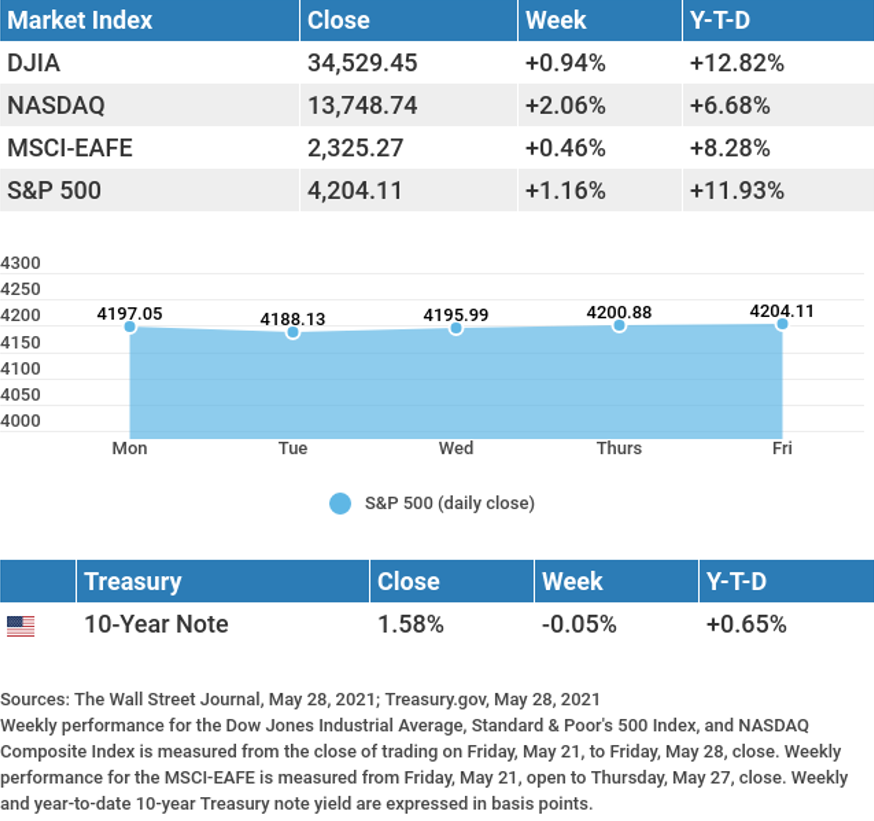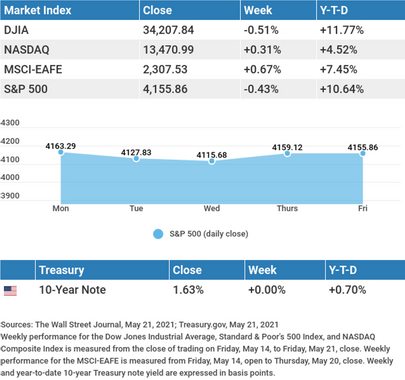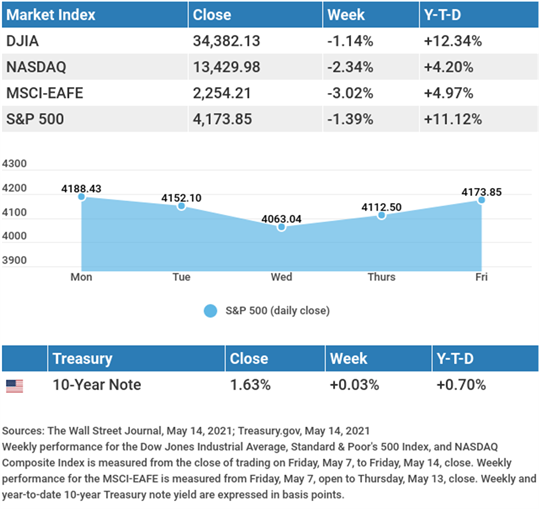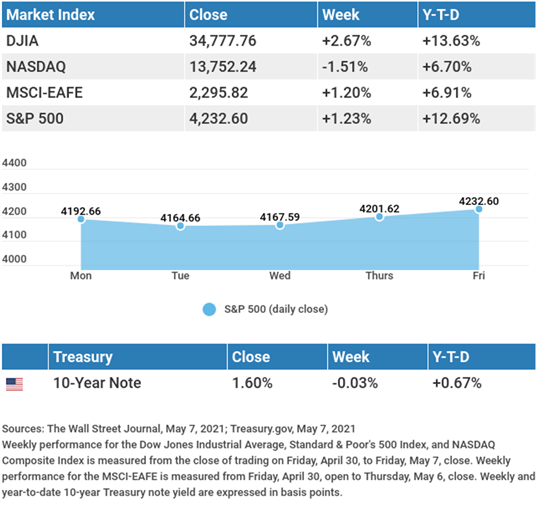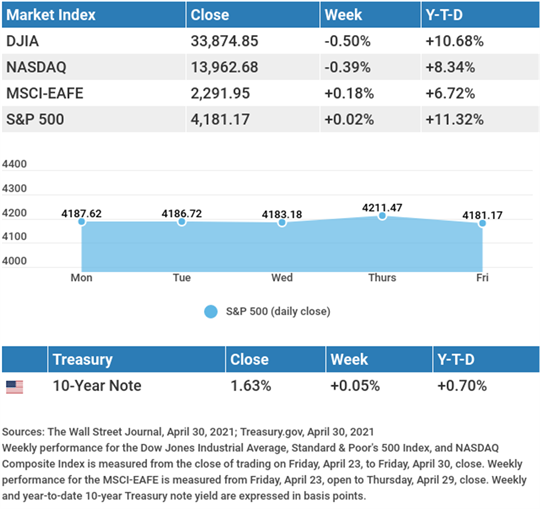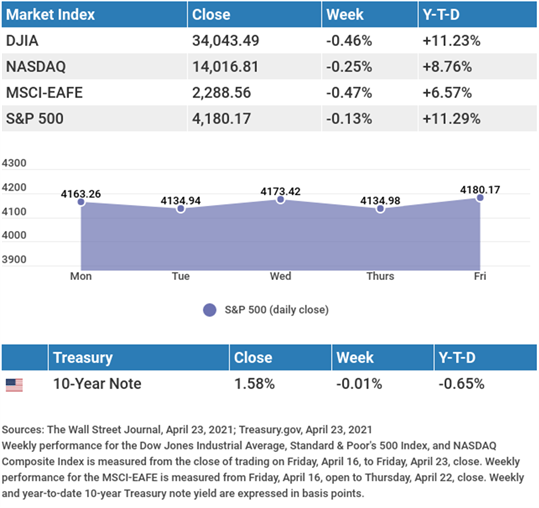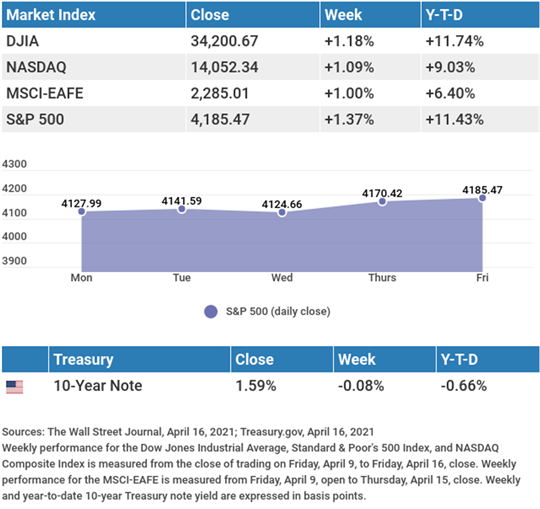
New messaging from the Federal Reserve on interest rates and inflation
last week led to a broad retreat in stock prices.
The Dow Jones Industrial Average dropped 3.45% while the Standard &
Poor’s 500 lost 1.91%. The Nasdaq Composite index slipped 0.28% for
the week. The MSCI EAFE index, which tracks developed overseas stock
markets, fell 0.64%.1,2,3

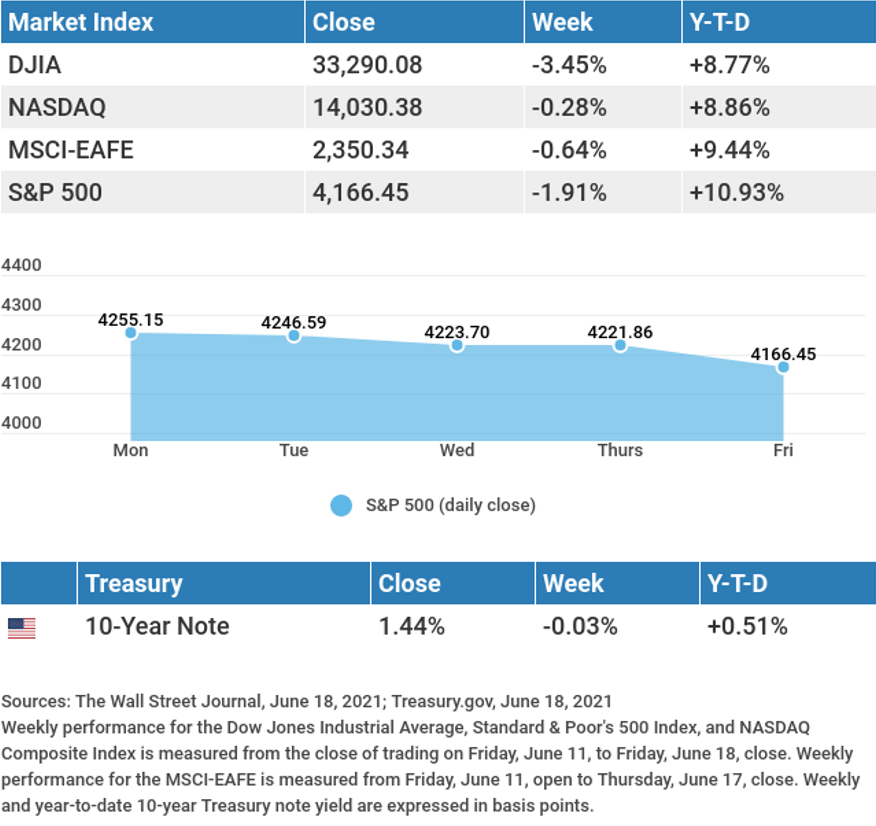
Unsettled Markets
The Federal Reserve’s announcement on Wednesday that interest rate
hikes may likely occur sooner than expected and that it had
underestimated the pace of inflation unsettled investors. The hardest hit
groups were cyclical stocks, like energy, materials, and industrials, as well
as financials and consumer staples.4
Losses accelerated into the week’s close on comments by St. Louis Fed
President James Bullard that the first rate hike could be as soon as 2022.
The bond yield curve flattened, as short-term interest rates rose in
anticipation of rising rates and longer-term rates declined, reflecting a
view of an eventual economic slowdown.
The Fed’s Surprise
Last week’s FOMC meeting announcement took investors by surprise as
the Fed indicated that two rate hikes in 2023 were likely. It was as recent
as March that the Fed had signaled that rates would remain unchanged
until 2024.4
The Fed also raised its inflation expectations to 3.4%, up from its March
projection of 2.4%, though it continues to believe that price increases will
be transitory in nature.5
The Fed provided no indication of when and by how much it might begin
tapering its monthly bond purchase program.6
Robert Roman
CEO, Managing Director
THIS WEEK: KEY ECONOMIC DATA
Tuesday: Existing Home Sales.
Wednesday: PMI (Purchasing Managers Index) Composite Flash. New Home Sales.
Thursday: GDP (Gross Domestic Product). Durable Goods Orders. Jobless Claims.
Friday: Consumer Sentiment.
Source: Econoday, June 18, 2021
The Econoday economic calendar lists upcoming U.S. economic data releases (including key economic indicators), Federal Reserve policy meetings, and speaking engagements of Federal Reserve officials. The content is developed from sources believed to be providing accurate information. The forecasts or forward-looking statements are based on assumptions and may not materialize. The forecasts also are subject to revision.
THIS WEEK: COMPANIES REPORTING EARNINGS
Wednesday: KB Home (KBH).
Thursday: FedEx Corporation (FDX).
Friday: Carmax, Inc. (KMX).
Source: Zacks, June 18, 2021
Companies mentioned are for informational purposes only. It should not be considered a solicitation for the purchase or sale of the securities. Investing involves risks, and investment decisions should be based on your own goals, time horizon, and tolerance for risk. The return and principal value of investments will fluctuate as market conditions change. When sold, investments may be worth more or less than their original cost. Companies may reschedule when they report earnings without notice.

“Done is better than perfect.”
– Sheryl Sandberg

Are Social Security Benefits Taxable?
Did you know that if you are receiving Social Security Benefits, you may have to pay federal income tax on a portion of these benefits? The amount you have to pay will depend on your specific income and filing status.
To find out if your Social Security benefits are taxable and you are single, take one-half of the Social Security money you received throughout the year and add it to your other income, which includes pensions, wages, interest, dividends, and capital gains. If the total comes to more than $25,000, then part of your benefits may be taxable.
If you are married filing jointly, take half of the Social Security money you received throughout the year, plus half of your spouse’s Social Security benefits, and add both of those amounts to your combined household income. If the total is more than $32,000, then part of your benefits may be taxable.
On their website, the IRS then lays out the percentage of benefits that are taxable based on the above calculation. These percentages vary between 50% to 85% and depend on your filing status and income levels. For example, if you are filing single with $25,000 – $34,000 income, 50% of your Social Security benefits may be taxable.
The Interactive Tax Assistant on IRS.gov can help you determine if your Social Security benefits are taxable and if so, by how much.
* This information is not intended to be a substitute for specific individualized tax advice. We suggest that you discuss your specific tax issues with a qualified tax professional.
Tip adapted from IRS.gov7

4 Benefits of Yoga
In addition to helping you finally be able to touch your toes, yoga has many other potential benefits, from helping you relax to even potentially helping your heart health. Here are some other potential benefits of yoga:
- Of course, yoga can decrease stress and promote relaxation. It’s a great practice to get more in-tune with your body and where you hold stress.
- Yoga may also be able to relieve anxiety. In one study, 34 women diagnosed with an anxiety disorder participated in yoga classes twice weekly for two months. At the end of the study, those who practiced yoga had significantly lower levels of anxiety than the control group.
- Studies show that yoga may help improve heart health and reduce several risk factors for heart disease. One study found that participants over 40 years of age who practiced yoga for five years had lower blood pressure and pulse rate than those who didn’t.
- Lastly, yoga may help fight depression. This may be because yoga can decrease levels of cortisol, a stress hormone that influences levels of serotonin, the neurotransmitter often associated with depression.
Tip adapted from Healthline8

Before Mt. Everest was measured, in 1819, what was the highest mountain on earth?
Last week’s riddle: What common English word has three consecutive double letters? Answer: Bookkeeper.


Footnotes and Sources
1. The Wall Street Journal, June 18, 2021
2. The Wall Street Journal, June 18, 2021
3. The Wall Street Journal, June 18, 2021
4. CNBC, June 16, 2021
5. The Wall Street Journal, June 16, 2021
6. The Wall Street Journal, June 16, 2021
7. IRS.gov, February 26, 2021
8. Healthline.com, August 30, 2019
Investing involves risks, and investment decisions should be based on your own goals, time horizon, and tolerance for risk. The return and principal value of investments will fluctuate as market conditions change. When sold, investments may be worth more or less than their original cost.
The forecasts or forward-looking statements are based on assumptions, may not materialize, and are subject to revision without notice.
The market indexes discussed are unmanaged, and generally, considered representative of their respective markets. Index performance is not indicative of the past performance of a particular investment. Indexes do not incur management fees, costs, and expenses. Individuals cannot directly invest in unmanaged indexes. Past performance does not guarantee future results.
The Dow Jones Industrial Average is an unmanaged index that is generally considered representative of large-capitalization companies on the U.S. stock market. Nasdaq Composite is an index of the common stocks and similar securities listed on the NASDAQ stock market and is considered a broad indicator of the performance of technology and growth companies. The MSCI EAFE Index was created by Morgan Stanley Capital International (MSCI) and serves as a benchmark of the performance of major international equity markets, as represented by 21 major MSCI indexes from Europe, Australia, and Southeast Asia. The S&P 500 Composite Index is an unmanaged group of securities that are considered to be representative of the stock market in general.
U.S. Treasury Notes are guaranteed by the federal government as to the timely payment of principal and interest. However, if you sell a Treasury Note prior to maturity, it may be worth more or less than the original price paid. Fixed income investments are subject to various risks including changes in interest rates, credit quality, inflation risk, market valuations, prepayments, corporate events, tax ramifications and other factors.
International investments carry additional risks, which include differences in financial reporting standards, currency exchange rates, political risks unique to a specific country, foreign taxes and regulations, and the potential for illiquid markets. These factors may result in greater share price volatility.
Please consult your financial professional for additional information.
This content is developed from sources believed to be providing accurate information. The information in this material is not intended as tax or legal advice. Please consult legal or tax professionals for specific information regarding your individual situation. This material was developed and produced by FMG Suite to provide information on a topic that may be of interest. FMG is not affiliated with the named representative, financial professional, Registered Investment Advisor, Broker-Dealer, nor state- or SEC-registered investment advisory firm. The opinions expressed and material provided are for general information, and they should not be considered a solicitation for the purchase or sale of any security.
Copyright 2021 FMG Suite.






